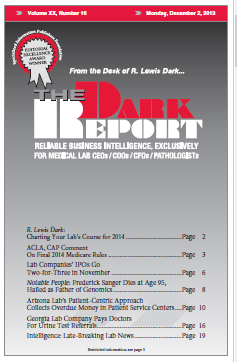CEO SUMMARY: This fall, a parade of molecular and genetic test companies moved forward with initial public offerings (IPOs) of their stock. In September, Foundation Medicine raised $106 million from its IPO. Encouraged by this success, three different companies proceeded with IPOs during November. The IPOs of Veracyte and Oxford Immunotec raised $58 million and …
Lab Companies’ IPOs Go Two-for-Three in November Read More »
To access this post, you must purchase The Dark Report.


